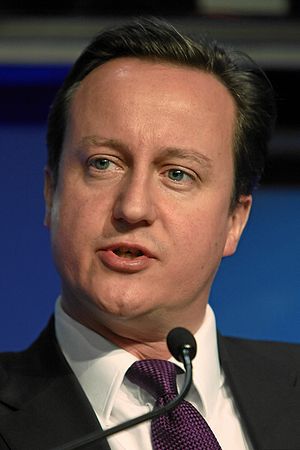 Image via Wikipedia
Image via WikipediaAt an event for LGBT Pride Month the British Prime Minister, David Cameron, picked on the UK's lobbying of African government's on LGBT human rights as an issue to showcase his government's credentials.
He specifically singled out Malawi for mention in his remarks, delivered to a Downing Street reception to which many of Britain's gay and lesbian great and the good were invited.
He claimed that the British coalition government's commitment to not cut its foreign aid budget meant it carried "moral authority" when speaking to global south countries about "what we expect from them".
"I’m very proud of the fact we [put] huge pressure on the leader of Malawi about an issue in that country but I’m convinced we can do more. We have got the ability to speak to African leaders, African governments, about this issue that I know concerns everyone here tonight. And it concerns me," he said.The 'issue' I presume he means in Malawi is the imprisonment for homosexuality of Steven Monjeza and Tiwonge Chimbalanga last year and their subsequent pardon by Malawian President Bingu Wa Mutharika - which Mutharika said was due to foreign pressure that culminated him being lobbyied by the UN General Secretary Ban-Ki Moon.
Britain is the biggest donor to Malawi however LGBT human rights issues have been only one small part of the 'carrot-and-stick' tactics used by Western donors on an increasingly repressive government. Far more important have been serious concerns about Mutharika's crackdown on media and civil society.
In a warning about how delicate these issues of using aid, especially when it comes with rhetoric like "moral authority", are, and despite LGBT issues being minor in the game being played with Malawi's government, they have used supposed pressure on LGBT issues to play to the local anti-gay gallery and to the 'African sovereignty' gallery and to divert attention from the real reasons aid might be diverted or even withheld. President Musceveni has used similar tactics, as have other anti-gay players in Uganda and elsewhere in Africa.
 |
| Mwakasungula (left), Trapence (right) |
Cameron's mentioning of Malawi drew little immediate response but Mwakasungula has welcomed Cameron's statement.
What, exactly, Cameron's rhetoric might mean though is opaque as the actions of the British Foreign and Commonwealth Office (FCO) as documented in its 2011 Human Rights report show very little activity in Africa on LGBT human rights.
Threats to individual civil society leaders tying their support for LGBT to supposed 'foreign influence' have occurred in Uganda, Zambia and Cameroon. Apart from Uganda, the FCO appears to have not done anything to support these other leaders, according to what they have said, however other governments have.
The FCO Human Rights report continues to focus largely on Europe and the documented work by overseas Embassies remains patchy.
For example, Nigeria travel advice barely mentions LGBT. It covers the existence of Sharia in Northern Nigeria (though this does not apply to foreigners) and that homosexuality is illegal under Nigerian Federal law.
This lack of coverage for travellers is matched in Home Office country information for decision makers on Nigerian asylum cases, which does not mention the treatment of LGBT people. Neither does this FCO report cover repression of LGBT in Nigeria (or any other West African country, including Senegal and Cameroon, both the focus of serious concerns). Nigeria is a significant source for LGBT asylum seekers and many have been removed there.
Yet the FCO report states that:
"When deciding on which countries to include, we also considered whether the country had been the target of a high level of UK engagement on human rights in 2010, and whether it would be likely to effect positive change in the wider region if their human rights record improved."The report covers extensive engagement with Nigeria, Africa's most populous nation, on human rights but no mention of LGBT. The same applies for other countries which heavily repress LGBT and which the FCO engages with on other human rights grounds, such as Pakistan.
To its credit, work which has had almost no international publicity but the FCO is known to have engaged with is pressure on the Democratic Republic of Congo against introducing legislation to criminalise homosexuality.
In the international system, such as at the UN and joining in with human rights agreements in the EU - including ones linking aid to human rights - the UK under this government has continued the previous government's support for LGBT. But there are over fifty countries in Africa and the evidence so far is that not only is Cameron's promise coming off an extremely low base but also that the rhetoric of "moral authority" has the potential to backfire.








 Join our page
Join our page


0 comments:
Post a Comment